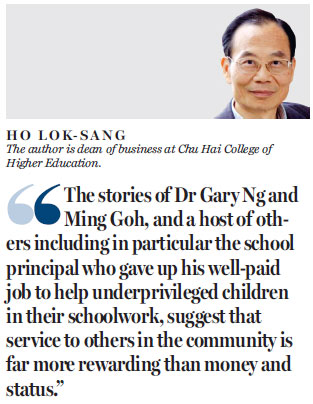What makes life worth living
Updated: 2016-11-01 09:53
By Ho Lok-sang(HK Edition)
|
|||||||||
Ho Lok-sang writes that money and status alone may not be the route to fulfillment - as demonstrated by the HK stories both of selfless heroes and a certain high flier who succumbed to darkness
Life is full of surprises, and they are not always pleasant. Dr Gary Ng Ka-wing was diagnosed as having bone cancer at the tender age of 14. After 12 sessions of chemotherapy and the amputation of his left leg, he managed to recover. Immensely grateful, he was determined to become a doctor himself, so that he could serve others just as others had served him. With determination and hard work, he was admitted to the medical school of the Chinese University of Hong Kong. Neither the physical handicap nor the demanding curriculum stopped him from actively participating in sports. He became an outstanding athlete, and won a bronze, a silver, and a gold medal in swimming events in the Ninth Guangzhou, Hong Kong, Macao and Taiwan Wheelchair Games. He is now the chairman of the Hong Kong Federation of Handicapped Youth, and is deeply involved in promoting sports for handicapped people as well as obstruction-free access.
Chan Cheuk-ming was born into a poor family on the mainland. Following the death of his father, he had to start working at the age of 13. He came to Hong Kong in 1979, and soon was working as head chef for a eatery in Sham Shui Po, one of the poorest districts in Hong Kong. Chan and his co-workers took over the restaurant after the owner retired. The restaurant had run into difficulties, but eventually emerged as a popular low-cost restaurant for the poor. Starting in 2008, Chan, now affectionately called Ming Goh ("Brother Ming") by others, started giving free meals to the needy through a free-meal coupon scheme run with the Society for Community Organization. In March 2016 his restaurant had to close down because of dramatic rent increases. Impressed by Chan's charitable work, the owner of a neighboring store, a Mr Tse, offered to lease his premises at a concessionary rate so Chan could continue his service to the community. The story of Ming Goh touched the hearts of many Hong Kong people.
Well-educated or not, people with a heart can make the world a nicer place to live in. They are examples to all of us.
Unfortunately, there are others, well-educated or otherwise, who have created hell for themselves and for others. The case of Rurik Jutting, who is being accused of murdering two Indonesian women, is both shocking and telling. Jutting was formerly a British banker and was educated at Cambridge University. After graduating from Cambridge, he landed a job in London, then moved to Hong Kong in 2013. With a highly paid job at Bank of America Merrill Lynch, he still could not find happiness. He said, "Hong Kong has made me realize that there's no direct correlation between money and happiness." He could not find meaning in his life or in his job, saying, "I feel guilty that I'm not in the office to close a financial deal for a soulless financial institution." He said he had lost contact with his parents for a long time, and there did not seem to be anyone who could have helped him.
Jutting cannot blame his mental condition on Hong Kong. It is the same Hong Kong that nurtured people like Ming Goh and Dr Ng. But obviously he had not learnt to find meaning in life. He said he had "emotionally harmed all of (his) ex-girlfriends". The fact that he said he would feel guilty for failing to close a financial deal for a soulless financial institution, however, does hint at the possibly alienating culture of some financial institutions. Not too long ago, news broke out that Wells Fargo bank, at one time the world's biggest bank by market capitalization, was at the center of a big scandal. The high-pressure sales culture at the 164-year-old bank led to abuse and falsification. As many as 2 million bogus deposit and credit card accounts were created in the names of customers without their knowledge, all because sales staff were pushed to achieve unrealistic targets.
One of my friends said he thought Switzerland is like paradise on earth. I have been to Switzerland and do agree that its scenery of mountains and lakes is captivating. Its peaceful and relaxing atmosphere offers great relief to city dwellers like me. However, even in this high-income country not everybody is happy. In June this year, Reuters reported: "An unusual number of suicides by top executives in Switzerland has prompted introspection in its business community over how senior managers are dealing with stress as its companies struggle to retain their status in the global economy." Actually, Switzerland's overall suicide rate is below the global average. But multiple suicides of senior executives, including the chief executives of several major financial and insurance institutions, do suggest that money and status alone may not make life worth living. The stories of Dr Gary Ng and Ming Goh, and a host of others including in particular the school principal who gave up his well-paid job to help underprivileged children in their schoolwork, suggest that service to others in the community is far more rewarding than money and status.

(HK Edition 11/01/2016 page1)